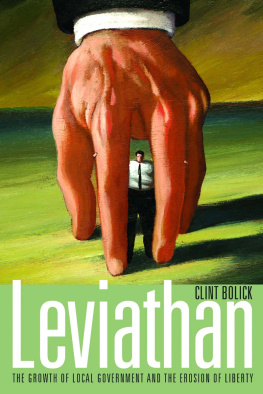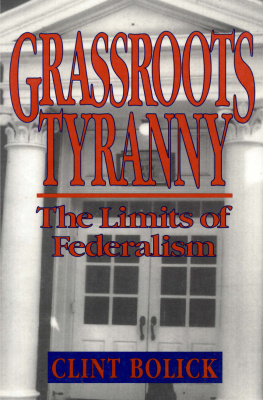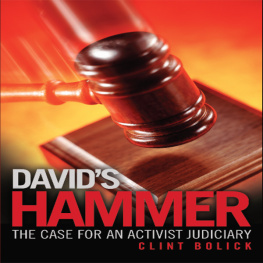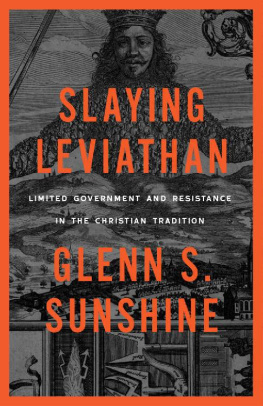ADVANCE COMMENTS ABOUT
Leviathan: The Growth of Local Government and the Erosion of Liberty
Local governments: Close to the people, laboratories of democracy, disciplined by the taxpayers right to move. These truisms no longer tell the truth. Bolick explains why [conservatives] long-held belief in states rights and local control makes little sense when special interests and judicial activism have acquired more clout in the byways than on the main thoroughfares of American politics. Powerful insights, convincingly presented.
Paul E. Peterson
Shattuck Professor of Government
Harvard University
In a nation dedicated to secure what the Constitution refers to as the blessings of liberty, a fundamental obligation of lawyers is to protect individual freedom. Few lawyers in this nation surpass Clint Bolicks accomplishments in this respect. In this book, Bolick relates his many fights against oppression as litigation director of the Institute for Justice. He has applied legal concepts and utilized public opinion to secure protections for individual liberties ranging from entrepreneurial freedom to racial justice and property rights. Bolicks story mitigates for me the pain I suffer when I read about lawyers misdeeds. Bolick also delivers an excellent critique of the enormous and unchecked powers wielded by a leviathan, his apt description for the combined authority of state and local government.
Bernard H. Siegan
Professor of Law
University of San Diego
The Hoover Institution on War, Revolution and Peace, founded at Stanford University in 1919 by Herbert Hoover, who went on to become the thirty-first president of the United States, is an interdisciplinary research center for advanced study on domestic and international affairs. The views expressed in its publications are entirely those of the authors and do not necessarily reflect the views of the staff, officers, or Board of Overseers of the Hoover Institution.
www.hoover.org
Hoover Institution Press Publication No. 531
Copyright 2004 by the Board of Trustees of the Leland Stanford Junior University
All rights reserved. No part of this publication may be reproduced, stored in a retrieval system, or transmitted in any form or by any means, electronic, mechanical, photocopying, recording, or otherwise, without written permission of the publisher.
First printing 2004
10 09 08 07 06 05 04 9 8 7 6 5 4 3 2 1
Manufactured in the United States of America
The paper used in this publication meets the minimum requirements of American National Standard for Information SciencesPermanence of Paper for Printed Library Materials, ANSI Z39.48-1992.

Library of Congress Cataloging-in-Publication Data
Bolick, Clint.
Leviathan : the growth of local government and the erosion of liberty / by Clint Bolick.
p. cm. (Hoover Institution Press publication ; no. 531)
Includes bibliographical references and index.
ISBN 0-8179-4552-0 (alk. paper)
1. Local governmentUnited States. 2. Civil rightsUnited States. I. Title. II. Series: Hoover Institution Press publication ; 531.
JS331B65 2004
320.80973dc22
2004004401
For my son,
Ryne Austin Bolick
ACKNOWLEDGMENTS
I am honored that this book is a collaboration with the Hoover Institution, which has emerged as one of the most creative, thoughtful, and influential public-policy organizations in America. I am especially indebted to John Raisian, Patricia Baker, Richard Sousa, and Ann Wood for their support of this project.
This book builds upon my previous work, Grassroots Tyranny and the Limits of Federalism, which was published a decade ago by the Cato Institute. I am grateful to Cato for allowing me to develop the themes and concepts upon which I build here.
While I was writing this book, I served as vice president . I remain affiliated with IJ as its strategic litigation counsel. I hope this book will serve as a fitting tribute to my more than twelve years at IJ and to my colleagues there, who serve as a constant source of inspiration and optimism.
Finally, I give thanks to those many (yet all too few) individuals who make possible the kind of freedom activism put into theory and practice by such groups as the Hoover Institution, the Institute for Justice, and the Alliance for School Choice. Were it not for your tangible commitment, we could not win the battle of ideas and extend freedom to those in our nation who lack it. With your support, we have only begun to fight.
Clint Bolick
Phoenix, Arizona
February 2004
INTRODUCTION
Pop quiz. Name the president of the United States.
Got it? That was easy.
How about your two United States senators? Your member of the House of Representatives? Bravo if youre still scoring 100 percent.
Now they get trickier. Name your mayor. Name a member of the school board. Not all of themjust one.
Give up yet? How about a member of the county governing board? The local planning commission? The local zoning board? The special authority that delivers your water?
Anyone picking up this book is probably better informed than the average person. Yet can even the most sophisticated reader answer all of those questions? (Im the author, and I was stumped after the fourth question.) We all know who our national elected officials are, but as they get closer to home, the image gets a bit fuzzier. It is a sad commentary on the state of our representative democracy that a majority of Americans probably dont know who their two U.S. senators are. When it comes to local officials like county board members and planning commissioners, the vast majority of people probably dont even know they exist, much less their identities.
And yet, it is not as if those individuals are unimportant. To the contrary, on essential matters of vital importance to every Americanthe quality of our childrens schools; the capabilities of police and fire departments; the provision of water, electricity, and sewage services; the amount of sales and property taxesthose local officials whose names and faces we dont even know are far more consequential to the intimate aspects of our everyday lives than the president.
Indeed, our nation was designed that it be so. Initially, we were a confederation of state governments that bound together for common but limited national purposes. From that initial experiment, we created a constitution intended to create a national government of limited and defined powers while keeping most government close to home where we could keep an eye on it.
Things havent worked out exactly as planned with regard to the first of those two constitutional objectives. We have a huge national government whose power is largely unchecked. Indeed, when most Americans think of big government, surely the image they conjure is our massive, remote, avaricious national capital.
In reality, the national government has downsized somewhat since the Reagan era. But President Bill Clinton had it wrong when he declared that the era of big government was over.
It just moved to the suburbs.
In a perverse sense, Americans have achieved their objective of primarily local government: The combined bulk of state and local government now exceeds that of the entire federal governmenteven including the militaryin both size and spending. Furthermore, even as the national government shrinks or stays relatively stable in size, state and local governments are growingin size, number, wealth, and power. And while they may be close to home, most Americans are decidedly














